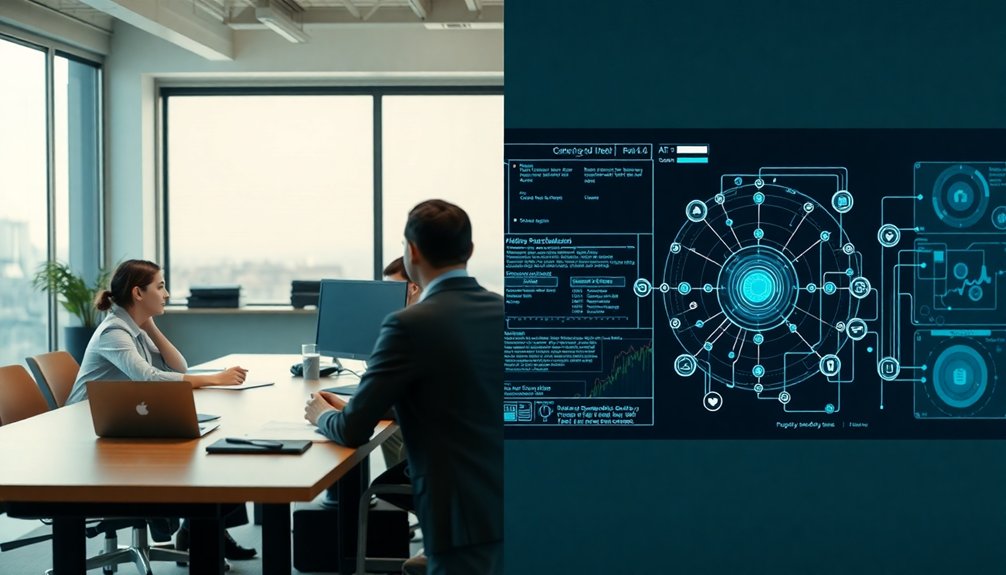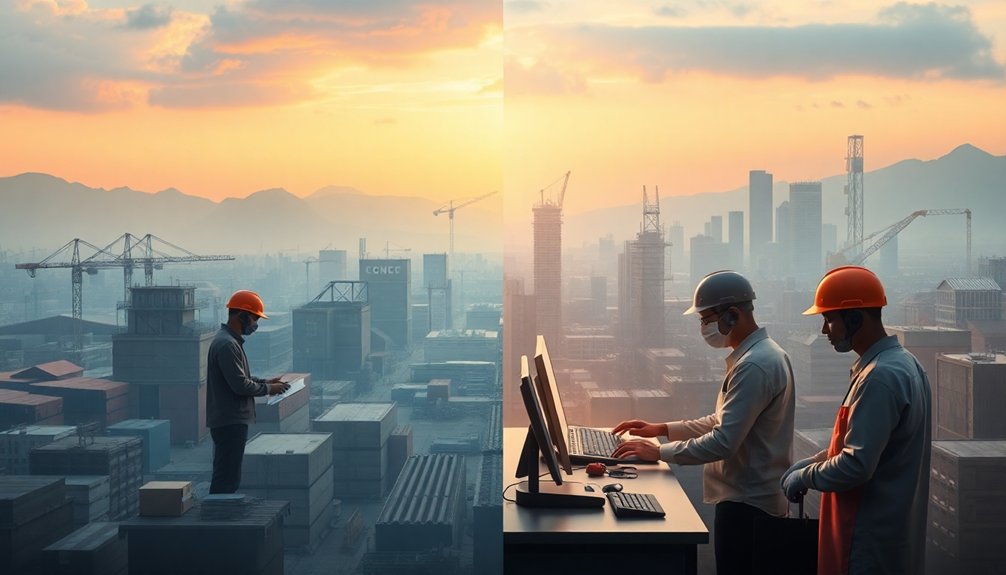AI isn’t stealing your job—it’s your new workplace wingman. You’re offloading mind-numbing tasks while leveling up to strategic thinking. Imagine algorithms handling data entry while you solve complex problems. This isn’t replacement; it’s collaboration. Machines crunch numbers, humans craft vision. Your value isn’t diminishing—it’s evolving. Want to know how you’ll dance with robots without getting stepped on? Stick around.
Decoding the AI Job Displacement Myth

While robots aren’t exactly marching into offices and firing employees en masse, the AI job displacement conversation isn’t just sci-fi paranoia anymore.
You’re looking at a future where AI transforms operational efficiency by automating routine tasks faster than humans ever could. Sure, translators and graphic designers might feel nervous, but it’s not all doom and gloom.
The nature of work is shifting, not disappearing. Think of AI as a hyper-productive colleague who’s great at repetitive jobs nobody wants. Human workers aren’t being replaced wholesale; they’re being nudged toward more complex, creative roles.
New opportunities in AI engineering and data science are popping up like digital daisies. The real question isn’t whether machines will take over, but how we’ll collaborate with them. Humanoid companion technologies are already demonstrating how advanced AI can seamlessly integrate into human work environments, suggesting a collaborative future rather than a competitive one.
High-Risk Sectors and Emerging Technologies
You’re standing at the edge of a tech tsunami that’s about to wash away entire job categories faster than you can say “artificial intelligence.”
From translation apps that can chat in 50 languages to self-driving vehicles eyeing delivery driver gigs, emerging technologies aren’t just knocking at the door—they’re kicking it down.
While some roles are getting automated into oblivion, you’ll want to keep your eyes on the prize: the new tech skills that’ll keep you employable in this wild robotic rodeo. Neuromorphic computing is rapidly transforming machine learning, creating more adaptive and intelligent robotic systems that could redefine workplace capabilities.
AI Job Disruption
Unless you’ve been living under a rock, it’s pretty clear that AI is about to flip the job market on its head.
AI will replace countless roles, from translators to graphic designers, with machines taking over repetitive tasks faster than you can say “algorithm.”
Think your job’s safe? Think again. Delivery drivers might soon be swapped for self-driving vehicles, while programmers could find themselves competing with AI-powered code-writing tools that debug faster than human fingers can type.
The stats are brutal: 61% of large U.S. firms are planning AI automation, which means job losses aren’t just possible—they’re probable.
We’re looking at a future where increased productivity comes at the cost of human employment, raising the million-dollar question: Are we innovating or just making ourselves obsolete?
Deep reinforcement learning is transforming how machines learn and adapt, potentially accelerating the pace of job displacement across multiple industries.
Technology Transformation Risks
As AI threatens to bulldoze through traditional job markets, the real earthquake is just beginning to rumble across entire industries.
You’re watching technology transform the nature of work faster than you can update your LinkedIn profile. AI will lower employment barriers in sectors like translation, programming, and logistics, fundamentally automating tasks that humans once owned exclusively.
The cost of innovation means companies can now replace humans with algorithms that work 24/7 without coffee breaks or health insurance. AI adoption isn’t just about efficiency—it’s a fundamental reshaping of how technology is used to solve complex problems.
While some roles will vanish, others will emerge, demanding specialized skills that machines can’t replicate. Reinforcement learning algorithms are enabling robots to adapt and learn from environments with unprecedented speed and precision, potentially creating new job categories that integrate human oversight with machine capabilities.
The question isn’t whether robots are coming, but how quickly you’ll adapt to their arrival.
Workforce Automation Trends
When artificial intelligence sets its cold, calculating eyes on job markets, entire professional landscapes start trembling.
You’re witnessing a massive workforce automation revolution where AI isn’t just changing jobs—it’s potentially replacing them. Translators, graphic designers, and programmers might soon find themselves competing with algorithms that work faster and cheaper.
The use of AI in industries like manufacturing, healthcare, and transportation is creating seismic shifts in human capabilities. Self-driving vehicles and advanced chatbots are already proving they can outperform humans in specific tasks.
Will these AI applications completely replace jobs, or just transform how we work? The smart bet is on adaptation: as robots take over routine tasks, humans will need to create new roles that leverage our unique creativity and emotional intelligence. Neural network algorithms are enabling robots to learn complex movement patterns, suggesting an increasingly sophisticated approach to automation across industries.
The Balancing Act: AI Integration and Human Oversight
You’re standing at the crossroads of human potential and technological revolution, where AI isn’t about replacing you but supercharging your capabilities.
Your unique skills — creativity, empathy, complex problem-solving — become even more valuable when paired with AI’s computational muscle, creating a symbiotic partnership that turns everyday work into something extraordinary.
AI Augments Human Potential
While robots aren’t stealing our jobs overnight, artificial intelligence is quietly transforming how we work by becoming a powerful collaborative partner.
AI integration isn’t about replacing you—it’s about augmenting your human capabilities. Think of AI as your hyper-efficient assistant, handling repetitive tasks so you can immerse yourself in complex problem-solving and ethical decision-making. Your creativity becomes the secret sauce that turns algorithmic outputs into breakthrough solutions.
Collaboration with AI doesn’t diminish your value; it amplifies your productivity. You’ll tackle challenges that require nuanced judgment, emotional intelligence, and strategic thinking—skills no machine can replicate.
The future isn’t human versus machine, but human and machine working together, each playing to their strengths. Sound like a win-win? Because it absolutely is.
Ethical Decision-Making Matters
As AI weaves itself deeper into our professional landscapes, we can’t ignore the ethical tightrope we’re walking. Human oversight isn’t just a nice-to-have; it’s mission-critical for maintaining fairness and accountability in AI systems.
| AI Capability | Human Intervention |
|---|---|
| Data Processing | Ethical Judgment |
| Pattern Recognition | Emotional Intelligence |
| Speed | Contextual Understanding |
| Consistency | Nuanced Decision-Making |
| Computational Power | Moral Reasoning |
Your emotional intelligence and ethical decision-making can’t be algorithmically replaced. When AI suggests a solution, you’re the ultimate gatekeeper. Human interaction guarantees we’re not just blindly following machine recommendations but critically evaluating them. Think of AI as a powerful assistant, not a replacement. It’s about collaboration, not competition. Can we leverage AI’s strengths while preserving our uniquely human capacity for complex, compassionate reasoning? You bet we can.
Upskilling for an AI-Driven Workforce

Unless you want to become career roadkill, it’s time to get serious about upskilling in an AI-driven world. The workforce isn’t waiting around for stragglers. Continuous learning isn’t just a buzzword—it’s survival.
With AI transforming industries, your ability to adapt determines whether you’ll thrive or get left behind. Think data science, cybersecurity, and AI engineering are just trendy careers? They’re your lifelines against job displacement. Specialized skills are your new currency.
Companies that invest in employee training aren’t doing you a favor—they’re creating adaptive workers who can dance with robots instead of being replaced by them.
You’ve got two choices: learn and evolve, or watch your professional relevance shrink faster than a cheap cotton shirt in hot water. Which side of history do you want to be on?
Hybrid Models: AI and Human Synergy
Imagine AI and humans as dance partners, each bringing their own killer moves to the professional floor. Hybrid models aren’t about replacing you—they’re about boosting your game. AI’s lightning-fast capabilities pair perfectly with your human oversight, creating a workplace dynamic that’s smarter than either could be solo.
Think of it like having a brilliant assistant who handles routine tasks while you immerse yourself in complex endeavors. But here’s the catch: this partnership demands serious employee training. You’ll need to learn how to lead this digital dance, ensuring quality control and keeping those algorithmic moves in check.
It’s not about competing with AI, but choreographing a performance where both partners shine. Ready to rewrite the workplace rulebook?
Economic Ripple Effects of AI Transformation

But here’s the twist: it’s not just about job displacement. AI’s economic impact means creating new workforce skill requirements.
Manufacturing, healthcare, and finance are already riding this wave, proving that smart machines can complement human talent. You’re not being replaced; you’re being upgraded.
Will some jobs vanish? Absolutely. But new roles in AI engineering and data science are emerging.
The economic ripple effects aren’t about elimination—they’re about strategic transformation. Ready to surf this technological tsunami?
Ethical Considerations in AI Deployment
How deep do the ethical rabbit holes of AI go? You’re staring into a technological abyss where accountability dances with biased decision-making. Ethical dilemmas aren’t just academic debates—they’re real-world challenges demanding human oversight.
| Risk Level | Potential Impact |
|---|---|
| High | Job Displacement |
| Medium | Algorithmic Bias |
| Low | Technology Dependence |
AI isn’t just changing workflows; it’s reshaping social dynamics and workforce engagement. Ethical training becomes your compass in maneuvering this complex landscape. You’ll need to ask tough questions: Who’s responsible when an algorithm makes a questionable choice? Can we trust machines to make nuanced decisions in healthcare or criminal justice? The future isn’t about replacing humans—it’s about augmenting our capabilities while maintaining a critical, skeptical eye on technological progress.
Reimagining Workplace Potential With Artificial Intelligence

While robots aren’t stealing your job overnight, artificial intelligence is quietly transforming how we work, think, and collaborate.
You’re not being replaced; you’re being upgraded. AI isn’t about eliminating human tasks but supercharging your potential. A Business School professor might tell you it’s about offloading routine data processing so you can focus on creative problem-solving.
AI empowers human potential: transforming work by elevating creativity and strategic thinking.
Imagine AI handling the mundane, while you tackle complex challenges that require emotional intelligence and strategic thinking. This partnership isn’t just about efficiency—it’s about creating new opportunities that make work more engaging and potentially improve your mental health by reducing repetitive stress.
The future isn’t human versus machine; it’s human and machine, working in elegant synchronization to push boundaries we’ve barely imagined.
People Also Ask About Robots
Why Won’t AI Replace Humans?
You can’t replace human creativity, empathy, and complex decision-making. AI’s a tool that’ll enhance your work, not eliminate it. You’ll adapt, learn, and collaborate, ensuring your unique skills remain irreplaceable in the evolving workplace.
Is Artificial Intelligence Replacing Human Requirements?
You’re not being replaced, but rather challenged to evolve. AI can handle routine tasks, yet it can’t replicate your unique creativity, emotional intelligence, and ethical decision-making skills that make you irreplaceable in complex roles.
Are Humans Going to Be Replaced by Robots?
You’ll likely see job shifts, not total replacement. As AI automates routine tasks, you’ll need to adapt, learn new skills, and focus on roles requiring complex human creativity, emotional intelligence, and strategic thinking.
Can We Completely Replace Humans With Robots Give Any Three Reasons?
Robotic roles rarely replace real reasoning. You can’t fully substitute human creativity, emotional intelligence, and ethical judgment with machines. Technology augments, not replaces, human capabilities, ensuring complex decision-making remains a distinctly human domain.
Why This Matters in Robotics
You’re standing at a crossroads where AI isn’t replacing you, but transforming how you work. Like a Swiss Army knife, intelligent tech becomes your collaborative partner, not your replacement. Embrace upskilling, stay adaptable, and you’ll ride this technological wave instead of being swept under. The future isn’t about humans versus machines—it’s about humans and machines dancing together, creating opportunities we can’t yet imagine.
